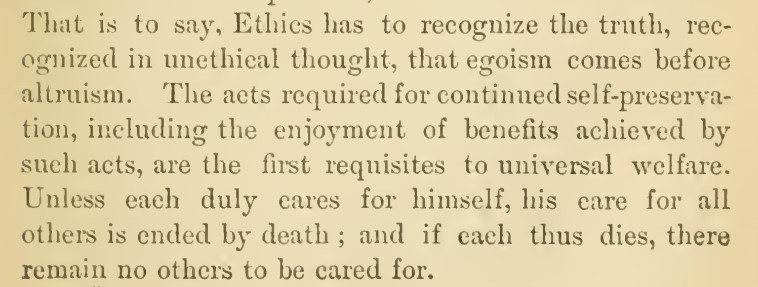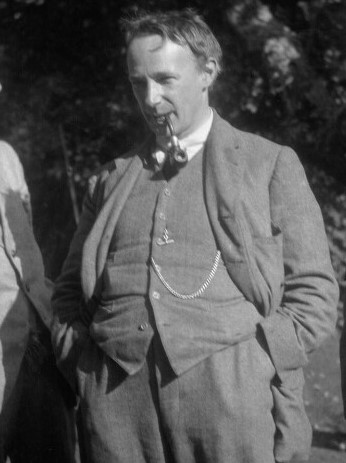
Today is #WorldPhilosophyDay!
And to celebrate, I thought I’d make a BIG THREAD taking a little look at what philosophers have seen as the big questions relevant to philanthropy and what they have had to say about them….
And to celebrate, I thought I’d make a BIG THREAD taking a little look at what philosophers have seen as the big questions relevant to philanthropy and what they have had to say about them….
Qn 1: Is egoism (i.e. self-interest) or altruism (i.e. concern for others) fundamental to human nature?
In the red corner here we have Thomas Hobbes, arguing that we are all basically bastards. (I’m paraphrasing here, but it’s close enough):

In the red corner here we have Thomas Hobbes, arguing that we are all basically bastards. (I’m paraphrasing here, but it’s close enough):


And in the blue corner we have anarchist philosopher Peter Kropotkin, arguing that altruism and cooperation are more fundamental than egoism and competition and that we are basically all quite nice: 



As Marius De Geus points out, Hobbes’ view is the basis for the justification of state power so a view like Kropotkin’s may well be seen as dangerous by those in charge... 

In the C19th Herbert Spencer (who was a major influence on Andrew Carnegie), tried to argue that a balance between egoism and altruism was needed, as too much of either would be bad: 





G.E. Moore in his “Principia Ethica” rejected this, and went back to the idea that egoism and self-interest was primary.
(As some critics have pointed out, this may not be entirely unrelated to Moore’s desire to justify sleeping with whoever he wanted. The salty old dog).

(As some critics have pointed out, this may not be entirely unrelated to Moore’s desire to justify sleeping with whoever he wanted. The salty old dog).


Qn 2: What is the nature of property?
Obviously a big old question, but important for philanthropy because, as JB Schneewind points out, “a serious history of thoughts about charity would be inseparable from a history of thought about property”.
Obviously a big old question, but important for philanthropy because, as JB Schneewind points out, “a serious history of thoughts about charity would be inseparable from a history of thought about property”.
For Thomas Aquinas, property was something put there by God and whilst individuals could lay claim to it, they only did so as stewards rather than owners - and this conferred a duty to give: 



Later on, new theories of property which viewed it instead as a natural right emerged.
Most notably in the not-especially-easy-to-interpret work of John Locke:

Most notably in the not-especially-easy-to-interpret work of John Locke:


As Steven Forde argues, Locke’s arguments on the nature of property (as well as those of philosophers like Grotius and Pufendorf) had big implications for our understanding of the nature of philanthropy too: 

Qn 3: Why Should we give?
First up here, let’s take Bishop Butler with this excellently unapologetic argument that the main reason is to get us off the hook for our sins:

First up here, let’s take Bishop Butler with this excellently unapologetic argument that the main reason is to get us off the hook for our sins:


Others have obviously argued very differently. E.g. Thomas Nagel (in his book “The Possibility of Altruism”) tries to establish an entirely rational basis for altruistic behaviour: 



Peter Singer, meanwhile, has argued that there is a moral compunction on each of us to act to save lives if we can (including through giving), using his famous drowning child argument: 



Whether we can establish a moral basis for giving of this kind without appeal to a higher authority of some kind is another question that has vexed philosophers, including G. E. M. Anscombe: 



Qn 4: Is Giving a Choice or a Duty?
This is one of the real biggies, which has taxed the minds of many great thinkers.
Aquinas again had something to say on this - considering both the argument that giving was a matter of pure choice and an objection to that argument:

This is one of the real biggies, which has taxed the minds of many great thinkers.
Aquinas again had something to say on this - considering both the argument that giving was a matter of pure choice and an objection to that argument:


These ideas were further developed around the enlightenment by thinkers like Grotius and Pufendorf- who (as Schneewind) outlines, drew a vital distinction between “perfect” and “imperfect” duties. 





Giving is usually argued to be an imperfect duty: i.e. there is a requirement to give, but not one that specifies how much or to what we must give (which remains down to the choice of the individual).
However, some have argued that as we develop new mechanisms of redistribution that can enable clearer specification of the nature of our duty to give back, giving can shift more towards being seen as a perfect duty.
E.g. Allen Buchanan
E.g. Allen Buchanan

Earlier on George Herbert Mead made a similar point about philanthropy, duties and taxation too:
And that brings us towards another big question…

And that brings us towards another big question…


Qn 5: What is the relationship between charity and justice?
A fascinating qn IMHO, one on which many great thinkers have had something to say, and which remains hugely relevant today.
A fascinating qn IMHO, one on which many great thinkers have had something to say, and which remains hugely relevant today.
Perhaps the most famous philosophical source here is Kant, who argued a number of times that the unequal nature of society mean that any redistribution through philanthropy should be seen as fulfilling a duty of justice rather than one of charity: 





And revolution fan and unapologetic professional irritant Thomas Paine (“Paine by name, pain by nature”) put forth some similar views: 



Later on, some adopted a more radical position that philanthropy was not merely an unacceptable substitute for justice but an impediment to achieving it (because it distracted from the revolutionary change needed).
E.g. Friedrich Engels
E.g. Friedrich Engels

In a slightly more genteel English way, Bertrand Russell made a similar point in a 1932 essay called “On Charity”: 





Here’s Thomas E. Hill Jr giving a great summary of how arguments about justice affect views on philanthropy: 





In a fascinating paper called “Severe Poverty As An Unjust Emergency”, Elizabeth Ashford tries to square the circle between the demands of justice and the seemingly voluntary nature of philanthropy: 

Others, meanwhile, lean into the idea that recognising claims of justice requires a fundamental rethink of the nature of philanthropy. E.g. Chiara Cordelli argues philanthropy by the wealthy should be seen as a duty of reparative justice to make up for how wealth was created: 

Qn 6: How should we give & how much?
OK, that’s really two questions, I know, but they tend to come together.
For some really early thoughts on this, we have Aristotle arguing for a duty to give (but not too much…)

OK, that’s really two questions, I know, but they tend to come together.
For some really early thoughts on this, we have Aristotle arguing for a duty to give (but not too much…)


Others have offered views on the ideal ways in which to give. E.g. Maimonides (aka Rambam, aka Moses Ben Maimon), whose “8 Levels of Giving” lie at the heart of the Jewish notion of Tzedakah even today: 



Others have been more bothered about who we give to.
E.g. David Hume’s view of charity was that if done indiscriminately it could do more harm than good by breeding dependency (a view that would come to shape Victorian giving):

E.g. David Hume’s view of charity was that if done indiscriminately it could do more harm than good by breeding dependency (a view that would come to shape Victorian giving):


Some, meanwhile, have taken on the question of when we should give. Francis Bacon, for instance, thought even back in the C16th that giving while living was preferable to waiting until you are dead: 



And that brings us to qn 7: Are perpetual endowments justifiable?
You might think spend-down vs perpetuity is a modern debate, but far from it. Here’s French Revolution thinker Anne-Robert-Jacques Turgot on the subject in the late C18th for instance:

You might think spend-down vs perpetuity is a modern debate, but far from it. Here’s French Revolution thinker Anne-Robert-Jacques Turgot on the subject in the late C18th for instance:


Others took on the fight. Notably C19th English social reformer Sir Arthur Hobhouse, who - it is safe to say - really didn’t like perpetuity as an idea… 



The most notable philosophical figure to wade into this debate was John Stuart Mill.
He agreed perpetual endowments are problematic (and suggested time-limiting them), but thought there was value in the fundamental idea of foundations as a way of ensuring plurality of thought:

He agreed perpetual endowments are problematic (and suggested time-limiting them), but thought there was value in the fundamental idea of foundations as a way of ensuring plurality of thought:


This unease about perpetuity whilst recognising the potential value of endowments in driving innovation and “discovery” has a clear present day lineage in the work of political philosopher Rob Reich: 



So there you go. Some philosophy of philanthropy for you.
You’ll note that I didn’t get into Effective Altruism here - not because it isn’t important but just because it’s a whoooooooole area of debate in itself. (Maybe for another thread eh...?)
You’ll note that I didn’t get into Effective Altruism here - not because it isn’t important but just because it’s a whoooooooole area of debate in itself. (Maybe for another thread eh...?)
But if you enjoyed this, and would like more along the same lines (including Effective Altruism this time!) then do check out the latest episode of @phil_isms_pod, in which I explore the philosophy of philanthropy in more detail:
philanthropisms.com/1862997/955680…
philanthropisms.com/1862997/955680…
There's also a philosophy of philanthropy reading list I made to go along with the podcast that has all of the sources in this thread plus loads more, which you can get here:
drive.google.com/file/d/1Jtmk-j…
drive.google.com/file/d/1Jtmk-j…
TTFN.
• • •
Missing some Tweet in this thread? You can try to
force a refresh

























